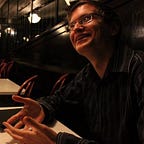Slow Down
Overcoming the “Stanford Duck Syndrome”
If there’s one thing I wish Stanford had in common with Harvard, it would have to be their welcome letter. Included in Harvard’s orientation packet is a seven page letter from former Dean Harry Lewis, entitled: “Slow Down: Getting More Out of Harvard by Doing Less.” In it, freshmen are explicitly advised to postpone declaring their major, to choose a profession based solely for interest, to take a year off, to keep extracurriculars under control, and to be average. I expect that many students laugh at such a letter, but I hope at least some readers take it, and today’s column, to heart.
Stanford students are obsessed with speed. At all hours of the day and night, they can be seen whizzing by on their bikes, narrowly avoiding death at the aptly named intersection thereof. At the post office, students in line roll their eyes and tap their toes, aching to hurry it along. It seems that we all have somewhere to go, and we want to get there as fast as we can.
We’ve even developed a special name to describe Stanford students’ veiled compulsion to stay on the move — the Stanford Duck Syndrome — which forces all afflicted, presumably the entire student body, to keep afloat by paddling madly under the surface while presenting a calm facade to their peers. For a long time, I believed this analogy to be inherently valid . . . until I actually observed a duck.
Granted, when ducks want to move, they can paddle their little tail-feathers across the pond in record time to grab a meal, or to avoid becoming one. But for most of the day, they just float there, no mad paddling required, slowly dabbling around the pond. The reason ducks look so calm is because they are — they have nothing on their minds except eating, sleeping, and floating. Believe me, if Stanford students really had Duck Syndrome, we’d do nothing but chill on the Oval all day.
As Dean Lewis was well aware, students at top universities are driven individuals. We petition to take 21 units when we know that 15 is a normal load. We join as many groups as possible, and when that’s not enough, we make plans to start our own. We come to Stanford with a resume as long as our arm, and we leave with one as long as our leg. We don’t date, because we’re too busy studying.
Consider, however, what would happen if we all took Lewis’ advice and simply slowed down a bit. Would the world come crashing down around us? Would dropping a few extracurriculars to make time for friends and family compromise your chances at getting a good job? Would postponing an Econ problem set long enough to go on a date with the potential love of your life really make you a failure? Lewis argues, and I wholeheartedly agree, that the answer to all of these questions is a resounding “No.” Unfortunately, students far too often put their academic success before those aspects of life which are, in fact, ultimately more fulfilling: leisure, love, and happiness. Slowing down can often provide the perspective needed to make more balanced decisions.
Around the world, people are beginning to realize that slowing down is not only the best way to stay sane, it’s also one of the best ways to live more sustainably. In recent decades, “Slow Movements” have developed to slow down almost every activity imaginable. There is Slow Food, which promotes sustainable agriculture as an alternative to factory farms and fast food; Slow Cities, which advocates eco-cities designed for pedestrians and bikes instead of cars; and Slow Design, which deeply considers the impacts of products on their users and the environment. Other movements include Slow Books, Slow Exercise, Slow Schools, Slow Shopping, Slow Travel, Slow Thinking, and even Slow Sex. In Praise of Slowness (2004) by Carl Honore is an enjoyable read about everything slow.
Whether you’re interested in saving the Earth or just staying sane, take some time in your busy day to slow down — your family, your friends and your future self will thank you for it.
Originally published in The Stanford Daily, May 15, 2008.
